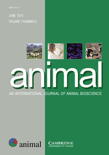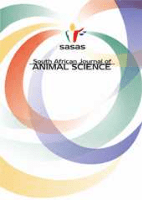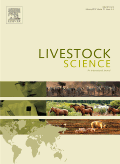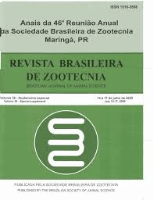
Animal Bioscience
Scope & Guideline
Unlocking Insights for Better Animal Management
Introduction
Aims and Scopes
- Animal Nutrition and Feeding Strategies:
Research on optimizing animal diets for improved growth performance, nutrient digestibility, and health outcomes. This includes studies on feed additives, alternative protein sources, and the impact of dietary components on animal metabolism. - Genetics and Breeding:
Exploration of genetic factors influencing traits in livestock, including growth, reproduction, and disease resistance. This encompasses genome-wide association studies, genetic diversity assessments, and the application of advanced breeding technologies. - Animal Health and Welfare:
Investigation of health management practices, disease prevention, and welfare assessments in various livestock species. This includes studies on stress responses, management practices, and the impact of environmental factors on animal well-being. - Meat and Dairy Quality:
Research focused on the quality of animal products, including meat tenderness, flavor profiles, and dairy composition. Studies often analyze the effects of feeding, genetics, and processing on product characteristics. - Microbiome and Gut Health:
Studies on the role of gut microbiota in animal health and production, exploring how dietary interventions and management practices can influence microbial populations and overall gut function. - Sustainable Animal Production:
Research aimed at improving the sustainability of animal agriculture practices. This includes studies on waste management, alternative feed resources, and environmental impact assessments.
Trending and Emerging
- Precision Nutrition and Feeding:
This theme encompasses research on tailored feeding strategies and nutritional interventions that optimize growth and health outcomes in livestock. The integration of technology in monitoring and adjusting animal diets is becoming increasingly popular. - Genomic and Molecular Studies:
Research utilizing genomic and molecular techniques to understand complex traits in livestock is on the rise. This includes studies on gene editing, epigenetics, and the molecular mechanisms underlying growth and disease resistance. - Sustainable Practices in Animal Agriculture:
Emerging research focuses on sustainability practices within animal agriculture, including the use of alternative feed sources, waste reduction strategies, and methods to mitigate the environmental impact of livestock production. - Animal Welfare and Behavioral Studies:
There is a growing emphasis on animal welfare research that examines the impact of management practices on animal behavior and well-being. This includes studies on housing conditions, social interactions, and stress management. - Microbiome Research and Gut Health:
The exploration of the gut microbiome's role in animal health and production is a rapidly expanding area of interest. Research is focusing on how dietary interventions can modify gut microbiota to enhance health and performance.
Declining or Waning
- Traditional Breeding Techniques:
There has been a noticeable decrease in studies focusing solely on traditional animal breeding methods. As genomic technologies and precision breeding techniques gain traction, research on conventional methods appears to be diminishing. - Generalized Animal Physiology Studies:
Research that broadly addresses animal physiology without specific applications to nutrition or health has become less frequent. There is a trend toward more targeted studies that connect physiological research to practical applications in animal production. - Single-species Studies without Comparative Analysis:
There is a declining interest in studies that focus solely on a single species without comparative insights. Researchers are increasingly recognizing the value of cross-species analyses to draw broader conclusions that can benefit multiple areas of animal science.
Similar Journals

Tropical Animal Science Journal
Connecting Science and Practice in Animal WelfareTropical Animal Science Journal, ISSN 2615-787X, E-ISSN 2615-790X, is an esteemed open-access journal published by the Bogor Agricultural University, Faculty of Animal Science. Launched in 2018, this journal serves as a pivotal platform for disseminating high-quality research in the fields of Animal Science, Food Animals, and Veterinary Medicine. With its significant presence in Indonesia and a commitment to scientific innovation, it has achieved a Q3 ranking in Animal Science and Zoology and Food Animals, as well as a Q2 ranking in Veterinary (miscellaneous) as of 2023. The journal also enjoys favorable Scopus rankings, placing it in the 61st percentile for General Veterinary and demonstrating its relevance and impact in the academic community. As an advocate for open-access publishing since its inception, the journal enhances accessibility to critical research findings, making it an invaluable resource for researchers, professionals, and students alike who aim to advance their knowledge and contribute to the fields of tropical animal science.

Animal
Elevating knowledge in Agricultural and Biological Sciences.Animal is a leading academic journal published by Elsevier that stands at the forefront of research in the field of Animal Science and Zoology. Founded in 2007, it has rapidly garnered a prestigious reputation, achieving a remarkable Q1 ranking in its category for the year 2023, placing it in the top 4% of journals in the discipline. With an impressive impact, as indicated by its rank of 19 out of 490 in Agricultural and Biological Sciences on Scopus, this journal serves as a vital platform for researchers, professionals, and students to disseminate groundbreaking findings and interdisciplinary studies. Animal not only offers paid subscription access but also provides an option for Open Access, thereby enhancing the visibility and reach of significant research contributions. With its comprehensive scope and commitment to advancing the understanding of animal biology, behavior, and welfare, Animal plays a crucial role in shaping the future of animal science. For anyone invested in the environment, veterinary medicine, or wildlife management, this journal is an essential resource that fosters knowledge exchange and continued developments in the field.

Applied Animal Science
Transforming Research into Real-World ImpactApplied Animal Science, published by Elsevier Science Inc, is an esteemed journal that has quickly made its mark in the fields of Animal Science and Food Science since its inception in 2019. With an ISSN of 2590-2873 and an E-ISSN of 2590-2865, this journal has received commendable recognition, achieving a Q2 ranking in both categories as of 2023. Encompassing a broad scope that integrates cutting-edge research and practical applications, Applied Animal Science seeks to disseminate knowledge that advances the well-being of animal systems and food safety. Researchers and professionals in the agricultural and biological sciences benefit from its high-quality articles, which are ranked #152 out of 490 and #200 out of 389 in their respective fields according to Scopus rankings. While currently not open access, the journal remains accessible to a global audience of scholars eager to explore innovative findings and robust methodologies. As it continues to grow through 2024 and beyond, Applied Animal Science aims to be a pivotal platform for fostering knowledge exchange and inspiring future studies in its domain.

SOUTH AFRICAN JOURNAL OF ANIMAL SCIENCE
Fostering excellence in animal research since 1974.SOUTH AFRICAN JOURNAL OF ANIMAL SCIENCE is a leading scholarly publication dedicated to the dissemination of original research, review articles, and critical insights in the fields of animal science and zoology. Established in 1974, this journal is published by the South African Journal of Animal Sciences and has since become an essential resource for researchers and professionals in the field. The journal, which currently holds a Q3 ranking in Animal Science and Zoology as per Scopus rankings, aims to promote scientific knowledge and innovation in animal husbandry, welfare, nutrition, and breeding practices, with a particular emphasis on the South African context. The journal's rigorous peer-review process ensures high-quality research is shared widely among the academic community. Researchers and students alike will find valuable content and access options that support ongoing education and professional development in this vital area of study. For more information, interested readers can contact the editorial office at PO Box 13884, Hatfield 0028, South Africa.

Translational Animal Science
Unlocking Insights for Better Animal CareTranslational Animal Science, published by Oxford University Press Inc, stands as a prominent journal in the fields of Animal Science and Zoology as well as Veterinary Sciences, achieving a commendable Q2 ranking in both categories for 2023. With an E-ISSN of 2573-2102 and transitioning to an Open Access model since 2017, this journal fosters accessibility and dissemination of vital research that bridges the gap between basic animal science and its practical applications. The journal's significant impact factor, where it ranks in the 71st and 65th percentiles respectively for Veterinary and Agricultural and Biological Sciences disciplines, highlights its importance as a resource for emerging trends and innovations in animal research. With submissions accepted until 2024, Translational Animal Science not only contributes to advancing knowledge but also aims to engage a broad audience of researchers, professionals, and students dedicated to improving animal health and welfare. Based in India, the journal serves as an essential platform for the exchange of scientific ideas that facilitate progress within these vital fields.

Livestock Science
Empowering the Livestock Community with Cutting-Edge ResearchLivestock Science is a prestigious academic journal published by ELSEVIER, dedicated to the comprehensive study of animal science and veterinary medicine. With an esteemed Q1 ranking in both the fields of Animal Science and Zoology, as well as Veterinary (miscellaneous) in 2023, this journal is recognized for its impactful contributions to the understanding of livestock health, production, and management. The journal has consistently earned its high position within Scopus, ranking 26th out of 194 in General Veterinary and 86th out of 490 in Animal Science and Zoology, reflecting its significant influence within the research community. The open access policy allows for broader dissemination of knowledge, promoting collaboration among researchers, professionals, and students alike. With its continuous publication cycle from 2006 to 2024, Livestock Science remains an essential resource for anyone interested in the advancements, challenges, and innovations within the field of livestock management and veterinary practices.

Poultry Science Journal
Championing innovative advancements in poultry production.Poultry Science Journal, with the ISSN 2345-6604 and E-ISSN 2345-6566, is an esteemed publication spearheaded by Gorgan University of Agricultural Sciences & Natural Resources since its transition to Open Access in 2013. Based in Iran, this journal serves as a vital platform for disseminating cutting-edge research and innovative advancements in the fields of Animal Science and Food Animals. With a current impact reflected in its Q3 quartile ranking within its categories and Scopus ranks indicating a competitive standing among peers, the journal plays a crucial role in enhancing the academic discourse surrounding poultry science. Researchers, professionals, and students alike are encouraged to engage with the journal’s high-quality content, which encompasses diverse topics including poultry genetics, nutrition, health, and welfare, thereby contributing to the improvement of poultry production practices globally. The journal’s commitment to accessibility ensures that valuable findings are readily available to the scientific community, fostering collaboration and advancing research in this essential domain of agricultural science.

Revista de Investigaciones Veterinarias del Peru
Advancing Veterinary Science for a Healthier TomorrowRevista de Investigaciones Veterinarias del Peru, published by UNIV NACIONAL MAYOR SAN MARCOS, stands as a pivotal resource within the field of veterinary sciences. With its ISSN 1682-3419 and E-ISSN 1609-9117, this journal aims to publish innovative research contributing to the advancement of veterinary practices and animal health. Since its inception in 1999, it has fostered an academic platform for professionals and researchers alike to share findings that are crucial for understanding and improving animal welfare in Peru and beyond. Although currently positioned in the Q3 category of Veterinary (miscellaneous) and ranked #163 out of 194 in the Scopus database, the journal's commitment to quality research and open access to veterinary knowledge continues to attract submissions and readership from a diverse audience. As it moves forward into 2024, the Revista de Investigaciones Veterinarias del Peru remains dedicated to disseminating critical insights that promote evidence-based practices in the veterinary field, stimulating further research and collaboration across continents.

CZECH JOURNAL OF ANIMAL SCIENCE
Pioneering Research for a Sustainable FutureThe Czech Journal of Animal Science, published by the Czech Academy Agricultural Sciences, is a premier open-access journal dedicated to advancing research in the fields of animal science and zoology. With an impressive ranking of Q2 in its category for 2023, it underscores its significance within the academic community, evidenced by its Scopus rank of #197 out of 490 in Animal Science and Zoology, placing it in the 59th percentile among peers. The journal has been a crucial platform for scholarly communication since its inception and has embraced open access since 2004, ensuring that research is widely available to a global audience. Targeted toward researchers, professionals, and students, the journal publishes high-quality original research, review articles, and case studies that contribute to the understanding and enhancement of animal science practices. Its commitment to rigorous peer review and its broad scope undoubtedly solidify its role as an essential resource for those engaged in animal research and agriculture, fostering continued innovation and knowledge transfer in this vital sector.

REVISTA BRASILEIRA DE ZOOTECNIA-BRAZILIAN JOURNAL OF ANIMAL SCIENCE
Empowering Knowledge in Brazilian ZootecniaREVISTA BRASILEIRA DE ZOOTECNIA - BRAZILIAN JOURNAL OF ANIMAL SCIENCE is a leading open-access journal published by the esteemed Universidade Federal Viçosa, dedicated to advancing the field of animal science and agricultural research in Brazil and beyond. With an ISSN of 1516-3598 and an E-ISSN of 1806-9290, the journal has been a crucial resource since its inception in 1996, now looking ahead to its continued contribution through 2024. As a Q3-ranked journal in Animal Science and Zoology, it provides a platform for high-quality research, encouraging the dissemination of cutting-edge studies and innovative methodologies. The journal's impact in the scientific community is further reflected in its Scopus ranking within the 46th percentile, evidencing its importance in the global discourse around animal science. For researchers, professionals, and students alike, REVISTA BRASILEIRA DE ZOOTECNIA offers a valuable opportunity to engage with timely, peer-reviewed content and contribute to the advancement of knowledge in animal sciences.